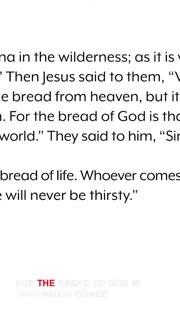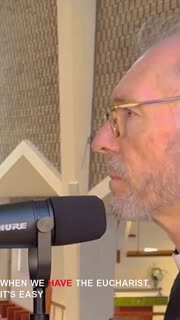Seeking True Nourishment: The Bread of Life
Devotional
Sermon Summary
Bible Study Guide
Sermon Clips
### Quotes for outreach
1. "Do not work for the food that perishes, but for the food that endures for eternal life, which the Son of Man will give you. For it is on him that God the Father has set his seal." [01:34] (10 seconds)
2. "For the bread of God is that which comes down from heaven and gives life to the world. They said to him, sir, give us this bread always. Jesus said to them, I am the bread of life. Whoever comes to me will never be hungry, and whoever believes in me will never be thirsty." [01:34] (18 seconds)
3. "Jesus is, and in John 1, we had Jesus as the true light of the world. And, you know, there's the people loving darkness. And there's darkness more than light. And so there's this theme already in John 6, running through these passages about truth and what's true and what's real and lasting versus what's temporal and earthly." [06:30] (20 seconds)
4. "And I think that that's the main, the central message of John is that we may all be one in God and Christ and that this is how we do it. And, uh, so in a way it's a, it's quite a different slant on some of the other Eucharistic language and other, in other scriptures." [12:41] (18 seconds)
### Quotes for members
1. "And he's giving them glimpses of what they think they want, but it's not the true stuff. He is the true stuff. And so I think he's leading them in, not in a tease, but kind of like a gentle way where they have to have their heart cracked open to really understand who he is." [06:30] (18 seconds)
2. "And, you know, if that's the message we're to get from the Eucharist, it's, it's consistently, um, about reconciling each other together. And becoming one. And I think that that's the main, the central message of John is that we may all be one in God and Christ and that this is how we do it." [12:41] (19 seconds)
3. "And I think here with Jesus, he's not, he's telling them this. It wasn't about what I did. Yesterday, it's about, you know, realizing who it is that gave you this bread and what it means to settle into that and rely on God providing and on, you know, whatever other lesson, you know, eternal lessons there are to draw from what happened to them and what Jesus did." [17:56] (26 seconds)
4. "When we have the Eucharist, it's easy for us to lose sight of gravity of what we're doing when we're gathered together. Yeah, yeah. For sure. You know, how it's supposed to transform us, not just, you know, check a box where we feel like we've struck the magic wand." [19:07] (15 seconds)
5. "If we're not truly, like, setting back to our North Star, to Jesus, and who it is we're following and how it is we're to follow, you know, the bread and the gathering is a reminder of that. And, you know, if it was about the bread, we'd have a lot yummier bread." [19:07] (16 seconds)
Ask a question about this sermon
1. "Do not work for the food that perishes, but for the food that endures for eternal life, which the Son of Man will give you. For it is on him that God the Father has set his seal." [01:34] (10 seconds)
2. "For the bread of God is that which comes down from heaven and gives life to the world. They said to him, sir, give us this bread always. Jesus said to them, I am the bread of life. Whoever comes to me will never be hungry, and whoever believes in me will never be thirsty." [01:34] (18 seconds)
3. "Jesus is, and in John 1, we had Jesus as the true light of the world. And, you know, there's the people loving darkness. And there's darkness more than light. And so there's this theme already in John 6, running through these passages about truth and what's true and what's real and lasting versus what's temporal and earthly." [06:30] (20 seconds)
4. "And I think that that's the main, the central message of John is that we may all be one in God and Christ and that this is how we do it. And, uh, so in a way it's a, it's quite a different slant on some of the other Eucharistic language and other, in other scriptures." [12:41] (18 seconds)
### Quotes for members
1. "And he's giving them glimpses of what they think they want, but it's not the true stuff. He is the true stuff. And so I think he's leading them in, not in a tease, but kind of like a gentle way where they have to have their heart cracked open to really understand who he is." [06:30] (18 seconds)
2. "And, you know, if that's the message we're to get from the Eucharist, it's, it's consistently, um, about reconciling each other together. And becoming one. And I think that that's the main, the central message of John is that we may all be one in God and Christ and that this is how we do it." [12:41] (19 seconds)
3. "And I think here with Jesus, he's not, he's telling them this. It wasn't about what I did. Yesterday, it's about, you know, realizing who it is that gave you this bread and what it means to settle into that and rely on God providing and on, you know, whatever other lesson, you know, eternal lessons there are to draw from what happened to them and what Jesus did." [17:56] (26 seconds)
4. "When we have the Eucharist, it's easy for us to lose sight of gravity of what we're doing when we're gathered together. Yeah, yeah. For sure. You know, how it's supposed to transform us, not just, you know, check a box where we feel like we've struck the magic wand." [19:07] (15 seconds)
5. "If we're not truly, like, setting back to our North Star, to Jesus, and who it is we're following and how it is we're to follow, you know, the bread and the gathering is a reminder of that. And, you know, if it was about the bread, we'd have a lot yummier bread." [19:07] (16 seconds)









